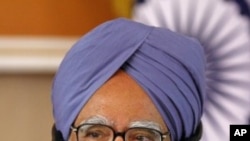In India, the government is considering measures to tackle high inflation, as spiraling food prices emerge as a key concern. There are growing worries about the impact of runaway inflation on India’s robust economic growth.
Indian Prime Minister Manmohan Singh met top cabinet ministers for the second straight day, Wednesday, to work out a strategy to check rising food prices.
The high-level meeting was convened as food inflation soared to more than 18 percent - the highest in more than a year.
High food prices have been in the spotlight since onion prices doubled, about two weeks ago, and other vegetables and food items became costlier.
Planning Commission Deputy Chairman Montek Singh Ahluwalia is expressing optimism that inflation levels will taper off, in the coming weeks.
"The government has already taken a number of steps, is considering other steps, definitely in the month of February we will see a different situation on pricing front for these sensitive commodities," said Ahluwalia.
In particular, the high price of onions has angered people. But measures taken so far, such as clamping down on exports and importing onions from Pakistan, have not had much impact in cooling prices. An anxious government has also raided onion traders to prevent hoarding.
Food prices are a sensitive issue in India, where nearly 800 million people live on less than $2 a day. With key regional elections to be held in several states in the coming year, the government is under pressure to ensure that basic food items such remain affordable.
But the government’s worries are piling up. The latest data shows industrial growth plunged sharply, to 2.7 percent in November, the lowest in six months. Finance Minister Pranab Mukherjee says high prices and the slowdown in manufacturing need attention.
"If industrial production goes down and inflation goes up, it will have an adverse impact. But I am not coming to any premature conclusion," said Mukherjee. "We shall have to look into and take the corrective measures."
The spiraling food prices have sparked fears that the Central Bank is likely to raise interest rates to check inflation. Interest rates were raised six times last year.
Economists say a further hike could slow down the momentum of growth in the economy, which has been expanding at nearly nine percent.
Indian Government Debates Measures to Tackle High Inflation




